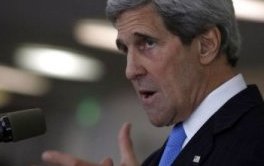Juba and Khartoum in “delicate place” over Abyei, US warns
May 28, 2013 (JUBA) – The US government has warned Sudan and South over the contested region of Abyei, saying the two countries were in a “delicate place” regarding the status of the oil-producing region.

“I think North and South [Sudan] are in a very delicate place right now. It is important to build on the peace process, the comprehensive peace agreement, to build on the new independence of the young state, and to put the focus and energy on the people and on developing the future, not on fighting the issues of the past,” said Kerry, in a statement extended to Sudan Tribune.
That’s our challenge, all of us, and we are certainly going to continue to work at it, he added.
The senior US official further pledged his government’s support for conduct of a referendum in the contested region, which he said was the only way to resolve the conflict. He however stressed that the voting should exclude the nomadic Arab members of the Misseriya tribe allied to Sudan.
“Abyei presents a special challenge, obviously. And I think we agreed that it was critical that Abyei be able to have a referendum with the appropriate Miseriya – that is the Miseriya who actually live in Abyei and have residence there year round, not the migrant Miseriya – that they be able to vote together with residents and then to decide the future”, Kerry’s statement reads in part.
Last year, the African Union mediation team proposed holding a referendum in Abyei this October, but that only those residing permanently in the area will be allowed to vote in the plebiscite and decide whether they want to join Sudan or South Sudan.
This proposal would effectively make the majority of voters come from the Dinka Ngok tribe, aligned with South Sudan thus putting the Arab Misseriya nomads, who spend several months in Abyei every year for grazing, at a disadvantage.
The mediators said that the exclusion of the Misseriya nomads comes in line with the decision of the Hague-based arbitration court, which defined the territory of the Ngok Dinka nine chiefdoms in July 2009.
However, Sudan swiftly rejected the plan, which received the blessing of the AU Peace and Security Council, suggesting the matter be referred to the United Nations Security Council (UNSC) to make it binding.
South Sudan president, Salva Kiir last week urged African leaders to provide the necessary support needed for resolution of the final status of Abyei.
Kiir, who was speaking at the 50th anniversary of the inception African body, also rejected Sudan’s proposal for formation of a joint interim administration in the area, arguing that time for the referendum was running short and that it is imperative that only a referendum commission is established in order to organise the vote.
Luka Biong Deng, a senior members of the south-ruling party (SPLM) said president Kiir and his Sudanese counterpart, Omer al-Bashir could not agree on the formation of the joint interim administration in the region.
“Our President Salva Kiir met Sudanese president Omer El Bashir today, but they did not agree. President Kiir expressed the need to establish the referendum commission but Bashir insisted on the formation of joint interim administration first”, Deng told Sudan Tribune from the Ethiopian capital, Addis Ababa.
Meanwhile, Edward Lino, the Co-chair of the Abyei Joint Oversight committee representing South Sudan said Tuesday that the people of Abyei will not accept any more delay of the referendum beyond October this year.
He called on the people of South Sudan and the international community to provide support needed for the conduct of the vote in the area, saying the vote will only determine the fate of the region.
(ST)
